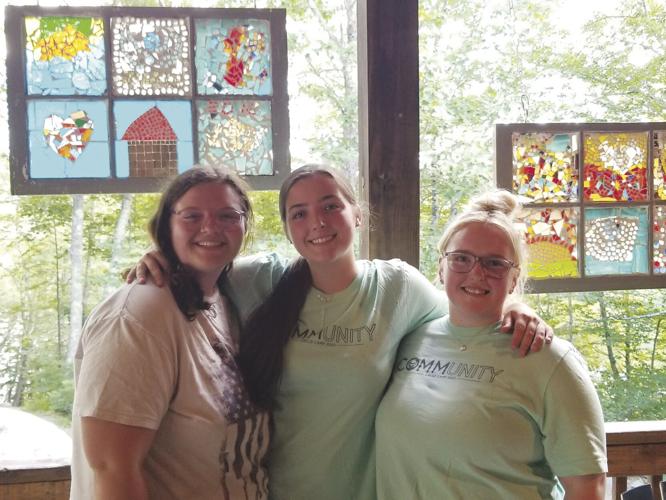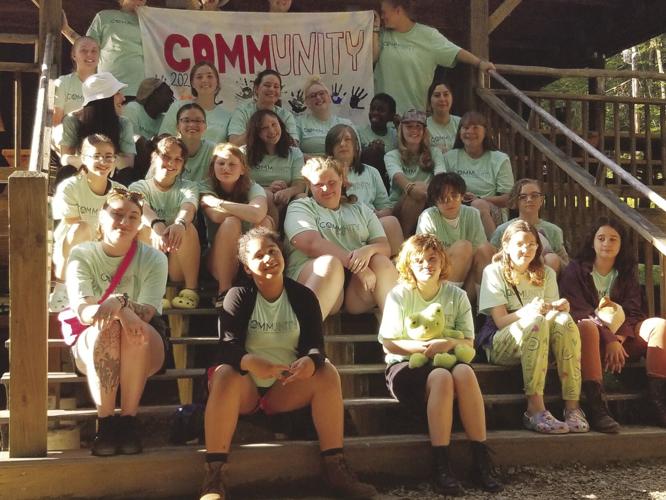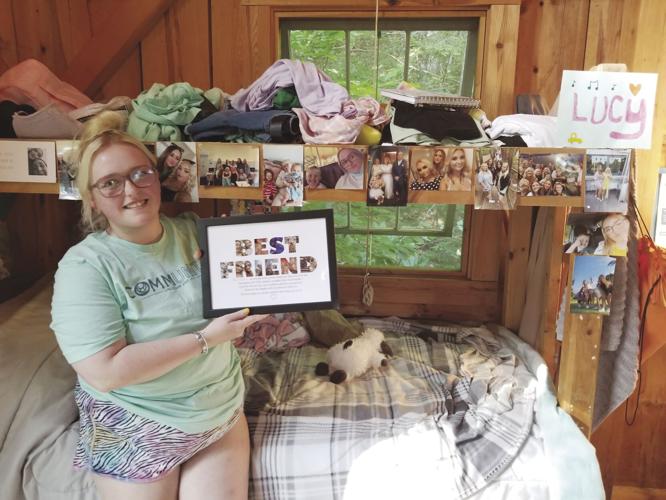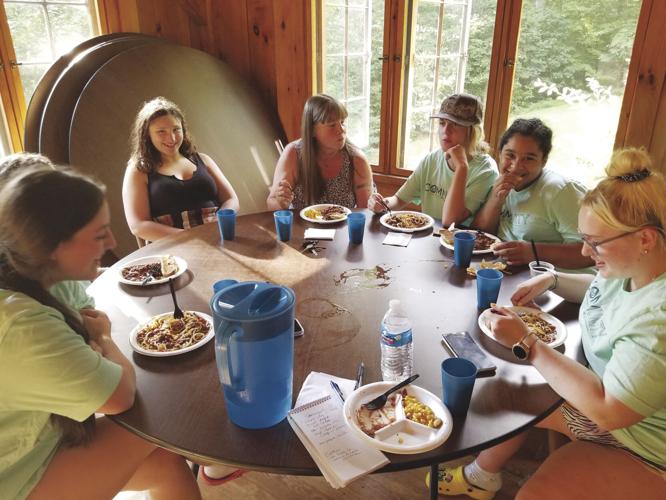GROTON — The sides of Aria’s wooden box are painted to resemble the patterns on a cow, with backgrounds in pink for strawberry milk and green for mint-flavored milk. Inside, a large stone with googly eyes is surrounded by a myriad of smaller ones, sparkling like polished sea glass in a treasure chest.
They’re known as gratitude stones, and they are exchanged between young people who value each other, even for something as small as a smile or saying hello. They signify thanks for being a friend, someone to talk to, when caring and sincere connection are rare and stand out like gems.
Giving and receiving them is a tradition at Circle Camp, where girls age 9 to 18 with social, financial and family challenges can find refuge and renewal during uncertain times. For these girls, home is not necessarily a safe or stable place to grow or be yourself.
The Circle Program, which includes the camp, is the only program of its kind in New Hampshire, and one of the only programs in the country that combine mentoring and camp for girls in rural areas. Begun in 1993 with 22 girls, Circle Camp has grown to enroll 80, most of whom come from 32 towns in the Lakes Region. Offered free to eligible families, the camp experience is a memorable and life-shifting gift.
At a closing ceremony on camp’s last day, Leah ponders why she received her stones. “Being a good friend. Comforting people. Being just a good person, I guess.”
“I think I got one from helping to clean the art room,” says Aria, who traded stones with Savannah, her new best friend.
Jack, a first-timer, gave stones to counselors and other campers. “To me they were like family and this place is like home to me.”
It’s a practice intended to help adolescents and teens recognize people and reasons to be grateful — which have not always been obvious, or easy to discern.
“Gratitude is the attitude, that’s the foundation of this camp, the message they want to get out,” said Lucy Davies, a counselor from Swansea, a city in Wales. People go home with collections, she said. “You most likely remember why you got that, and the message behind it.”
Two panels of mosaics are made from stones that campers have given and received, fashioned into what now look stained glass windows. They hang from a porch on the camp’s lodge overlooking Spectacle Pond, a quiet stretch of water west of Newfound Lake, where birds glide noiselessly and flutter before landing. Motorboats are not allowed. Swimming, kayaking and stand-up paddleboarding reign. The cabins are linked by trails winding through woods.
The connection to this singular place is felt over miles and years — including by alumni, many of whom return to serve as mentors or counselors, and stay in touch over time as enduring friends.
“There is something special about camp,” said the program’s mentor coordinator, Rebekah Lewis, who is studying for a master’s degree in social work. “You don’t forget that feeling and it keeps bringing you back. It goes beyond friendship here. It’s like family.”
“This camp has a lot of emotion,” said Melody Buskey of Bristol, who started as a camper at 9 and now works as a line cook and floating counselor. “We felt it was a home away from home when we got here.”
An oasis in turbulent times
For 29 summers, the Circle Program has provided one- to three-week summer camps and outdoor bonding experiences for adolescent and teenage girls who have been referred by their school guidance counselors, and who receive free or reduced lunch. Their hurdles and challenges at home may include financial hardships and the addiction, incarceration or death of a parent or grandparent, or neglect or abuse.
A recent survey found that 26% do not live with a biological mother or father. Some live with a grandparent or great-grandparent. For some, home is a shifting stage of adults who may or may not be counted on for anything, whether for guidance or a meal. Survival depends on lessons learned early. Thriving depends on finding outside support — and Circle Camp is a supportive, bond-building retreat.
“Here they discover their fellow campers have had similar experiences, which enables them to open up and talk,” said Lewis. “There’s a positive vulnerability about being at camp. They feel safe and secure at telling their story.”
The camp also provides LGBTQ inclusivity, which is a work in progress across New Hampshire, said camp director Lindsey Collins.
“It helps to be disconnected from the world and have all this time to dig into creativity and imagination,” said Lewis, who is trained in mental health first aid. Standing in art room lined with drawings, paintings, collages and jewelry-making supplies, she holds up a tiny terrarium jar, a favorite craft. “You can create your own little world in these bottles,” she said. Last year’s group painted designs on Adirondack chairs for the porch.
Inside the lodge is a science loft and a library where the girls find engrossing books to read and relax with yoga and mindfulness sessions. Days are scheduled with specific times for swimming, art, science and nature exploration, and outdoor adventure, including a low ropes course where they learn to take risks and challenge themselves.
“The structure of this camp really helps. The kids like knowing they’re doing this at a certain time for so long,” said Alyssa Johnson, 17, of Plymouth, a former camper who now works as a counselor. Quiet time comes after lunch, when campers read, write letters, draw or nap.
“We listen to music to calm our minds,” said Courtlynn, a first-time camper.
On the stairs leading up to Newfound cabin, Courtlynn practices a song she’ll perform at the talent show on the last night: “Traitor” by Olivia Rodrigo. It’s a tune that’s popular here. Her rendition is heartfelt, almost professional sounding.
When she came to camp two weeks ago, Courtlynn’s counselor said she stood apart, singing and dancing alone. Now she’s bubbly and effusive, engaged with the other 13-year-olds in her cabin and the kids and counselors she sees during the day. At dinner she is all smiles. The girls, including Cortlynn, remark how nice it is to have a variety of foods, including tacos made by the cook who comes from Mexico, and the ability to go back for second and third helpings, which is not an ordinary experience at home.
“There are so many things here,” one girl says when asked what she likes best about camp. Everyone agrees that making friends tops the list.
The life-changing power of connection, thankfulness
The life-changing power of the Circle Program lies in its summer immersion plus year-round follow-through, which launches the girls as they grow into adulthood. They come from greater Concord and the wider Lakes Region, north to Waterville Valley and west to Ossipee, and are usually identified in elementary or middle school. They attend summer camp, then receive one-on-one mentoring until they graduate from high school.
It’s the embodiment of research findings that having one trusted adult can make a monumental difference for vulnerable children as they navigate the mazes of school and life. Recent studies show that in key social and emotional ways, girls suffered more than boys from the isolation and upheavals of COVID, and were more likely to experience greater levels of anxiety or depression and higher rates of self-harming behavior — along with the sense of hopelessness that affected lower income students hardest.
During the pandemic, “Kids were severely impacted by their lack of social engagement, education challenges and increased depression and anxiety,” said Charlotte Hassett, director of child and family services at Lakes Region Mental Health Center. This played out as emotional disregulation, oppositional behavior, challenges with peer relationships and transitioning, and more acting out.
Through a grant offered jointly by the New Hampshire Department of Education and the Community Mental Health Association, LRMHC sent mental health specialists to Circle Camp this summer to help staff and campers work through inter-personal problems and past traumas, and better support social and emotional wellbeing. “They help with everyday dramas and the feelings that come up,” said Lewis, and train staff how to deal with suicide ideation.
Counselors at Circle Camp agree that internal emotional struggles in girls are not always obvious, because they are more likely than boys to keep them bottled inside. Triggering speech and actions can spark rudeness, anger or sadness.
Some past traumas are both heartbreaking and isolating. One of the most common experiences among this year’s campers is death of a close family member. This year’s cohort included a girl who came home and found a parent passed away.
“For the last two years, the mental health of our participants has been very concerning,” Circle Program Executive Director Beth Dever said. “There’s a huge need to understand when someone is triggered, angry or sad and being able to work with those situations. The stories they come with as baggage — death or drug-involved parents, and being raised by great-grandparents, not even grandparents” — are moving and complex, worsened by sequestering alone at home without school as a refuge.
COVID drastically expanded their social life online, changing how they view the world and communicate. “When they talk, they’re beyond their years, further than they should be, but they don’t know how to process it, or what to do with it,” Dever said.
The result is worldly awareness without maturity, which compounds rootlessness and insecurity. The Circle Program, with its summer camp and long-term follow-up, helps girls forge resilience, discover and shore up their inner strengths, and zero in on goals and provide the guidance and support to reach them — especially when the future looks murky or bleak, and their present is riddled with pop-up storms. Amid trauma, it nurtures positivism. It’s a compass, a dependable pasture, and an opportunity to unwind and reset.
That mission remains “so basically important. The isolation of COVID was particularly hard on the girls that Circle Program serves,” said Seton O’Reilly, 86, one of its founders and a member of the board of trustees at Camp Onaway in Hebron, which started Circle Camp as an outreach and continues to support it financially. Regardless of the culture and the changing times, “girls particularly need that companionship and to talk to somebody. I think what this must mean for the girls just to be protected and be themselves,” she said.
“These girls often have similar situations. It’s a chance to share some of that and support each other and have a mentor they can trust,” said Carol Southall, 85, a former director of Camp Onaway and founding trustee for Circle Camp. “We’re living in a very stressful time and it’s so important to be back and in touch with nature. Right now there’s so much divisiveness in this country and they’re learning what community is.”
“I think this was the best opportunity I was ever given,” said Johnson, who began as a camper and came for nine summers. Her mom is a Circle Program alumna. “All of my friends, my whole friend group I met here.”
Next May, Johnson, a Plymouth Regional High School senior, will become a licensed nurse assistant, before she studies in college to become a registered nurse — a path she carved with help from the Circle Program mentor she had for five years. “It’s a nice family that you create here.”
“It’s just so peaceful, and it’s such a community,” said Davies, the counselor from Wales, who amassed a bounty of gratitude stones after arriving in June. Since then, she has distributed a war chest of stones to people she’s met and cares about and mailed some to her parents in Wales to thank them for years of encouragement. “You make friendships here and bonds you know are going to last,” Davies said.
Collins, the current camp director who began seven summers ago as a lifeguard and swimming instructor, relishes witnessing the bonds come full circle, which underscores their impact and reach.
“I see kids grow from campers to counselors to mentors,” said Collins. “I see them then grow through every aspect of the program, then return to give back.”






















(0) comments
Welcome to the discussion.
Log In
Keep it Clean. Please avoid obscene, vulgar, lewd, racist or sexually-oriented language.
PLEASE TURN OFF YOUR CAPS LOCK.
Don't Threaten. Threats of harming another person will not be tolerated.
Be Truthful. Don't knowingly lie about anyone or anything.
Be Nice. No racism, sexism or any sort of -ism that is degrading to another person.
Be Proactive. Use the 'Report' link on each comment to let us know of abusive posts.
Share with Us. We'd love to hear eyewitness accounts, the history behind an article.